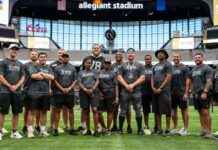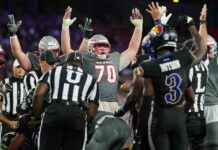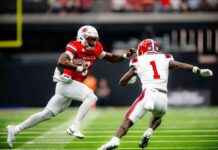UNLV Football Faces Changes as Matthew Sluka and Michael Allen Leave Team
The UNLV football team is experiencing significant changes as two key players, Matthew Sluka and Michael Allen, have announced their departure from the program. The news comes amidst a wave of changes in college athletics, particularly with the implementation of Name, Image, and Likeness (NIL) sponsorship deals.
Matthew Sluka, a talented quarterback for UNLV, has decided to leave the team due to a lucrative NIL sponsorship deal. This move has sparked discussions about the impact of NIL deals on college athletes and their decisions regarding their collegiate careers. Sluka’s departure leaves a void in the UNLV roster, as he was a promising player with a bright future ahead of him.
In addition to Sluka, running back Michael Allen has also announced his decision to enter the transfer portal. Allen, who had shown potential in his three games with UNLV, cited a desire for more opportunities as a key factor in his decision to leave the program. His departure further underscores the challenges that student-athletes face in navigating their athletic careers while balancing academic and personal aspirations.
Armani Lingo, a sports analyst, has provided insights into the UNLV football situation, shedding light on the implications of Sluka and Allen’s departures. Lingo’s breakdown of the events offers a perspective on the changing landscape of college athletics and the pressures that student-athletes face in today’s competitive environment.
UNLV Running Back Michael Allen Enters Transfer Portal
Michael Allen, a running back for UNLV, has announced his decision to enter the transfer portal at the end of the season. In a statement posted on social media, Allen expressed gratitude for his time at UNLV while highlighting his desire for more opportunities to showcase his skills on the field. The decision to utilize his redshirt status as a junior reflects Allen’s commitment to pursuing his football career with a renewed focus on his development as a player.
During his time at UNLV, Allen demonstrated his potential as a valuable asset to the team, accumulating 108 yards on 19 carries in just three games. His departure from the program represents a loss for UNLV but also presents an opportunity for Allen to explore new avenues for his athletic career. As student-athletes navigate the complex landscape of college athletics, decisions like Allen’s underscore the importance of pursuing opportunities that align with their goals and aspirations.
Implications of NIL Sponsorship Deals on College Athletics
The departure of Matthew Sluka from the UNLV football team due to an NIL sponsorship deal raises questions about the impact of such agreements on college athletics. As student-athletes are now able to profit from their name, image, and likeness, the landscape of collegiate sports is undergoing significant changes. The allure of lucrative sponsorship deals can influence players’ decisions regarding their collegiate careers, as seen in Sluka’s case.
While NIL deals offer student-athletes the opportunity to capitalize on their talents and marketability, they also present challenges in terms of balancing athletic commitments with academic responsibilities. The growing trend of athletes pursuing sponsorship opportunities highlights the evolving nature of college athletics and the need for institutions to adapt to the changing environment. As more players explore NIL deals, programs like UNLV will need to navigate these new dynamics to retain top talent and remain competitive in the recruiting landscape.
Moving Forward: UNLV Football’s Path Amidst Changes
With the departures of Matthew Sluka and Michael Allen from the UNLV football team, the program faces challenges in rebuilding its roster and maintaining competitiveness in the Mountain West Conference. The loss of key players like Sluka and Allen underscores the need for UNLV to adapt to the evolving landscape of college athletics and recruit new talent to fill the void left by their departure.
As student-athletes continue to navigate the complexities of balancing athletic and academic pursuits, programs like UNLV must provide support and resources to help players succeed both on and off the field. The impact of NIL sponsorship deals on college athletics adds another layer of complexity to the recruitment and retention of top talent, requiring institutions to stay abreast of industry trends and regulations to remain competitive in the collegiate sports landscape.
In conclusion, the changes within the UNLV football program reflect the broader shifts occurring in college athletics as student-athletes navigate the opportunities and challenges presented by NIL sponsorship deals. The departures of Matthew Sluka and Michael Allen highlight the complexities of balancing athletic aspirations with personal and career goals, underscoring the need for programs to adapt to the changing dynamics of collegiate sports. As UNLV moves forward, it will be essential for the program to embrace these changes and support student-athletes in achieving success both on and off the field.











